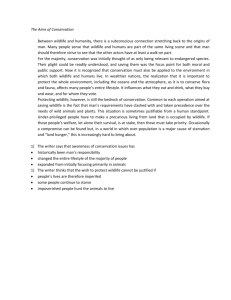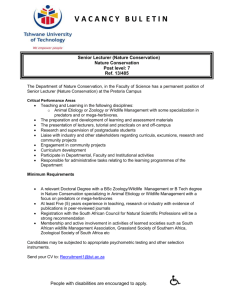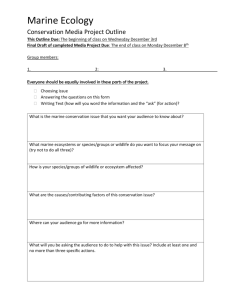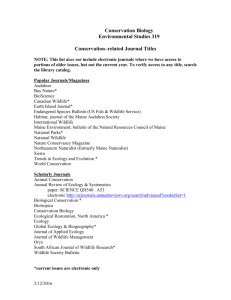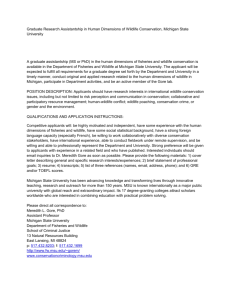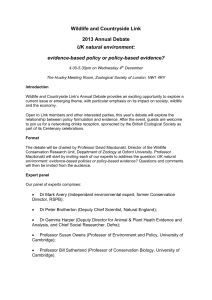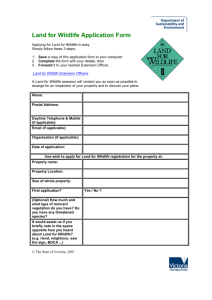Information Inquiry assignment
advertisement
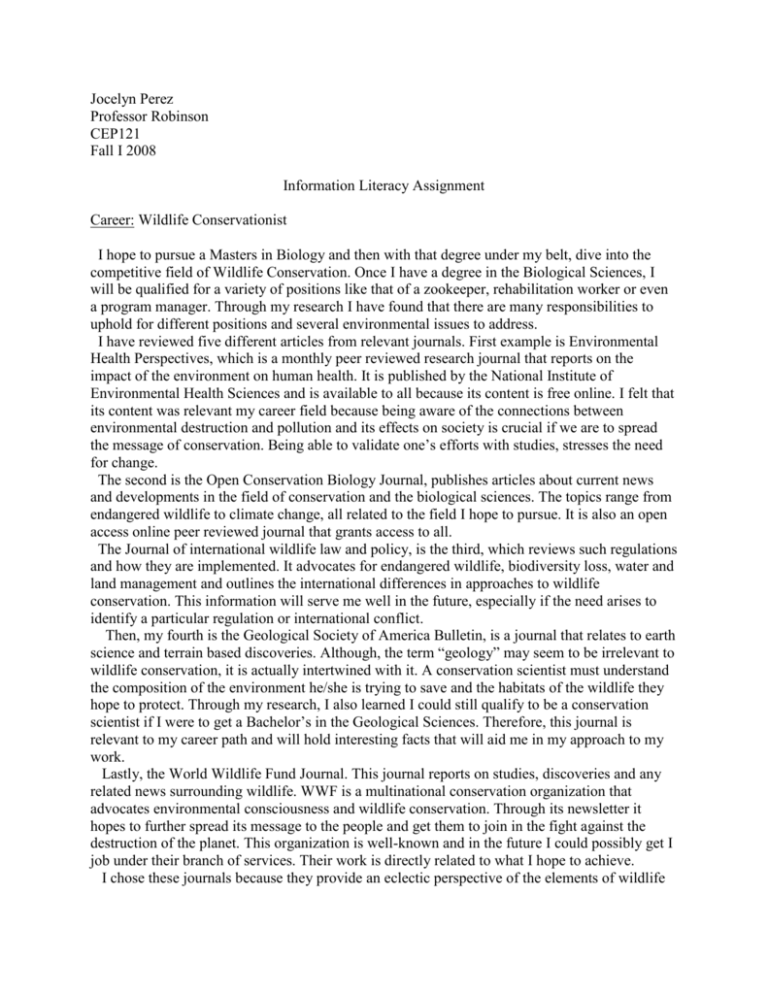
Jocelyn Perez Professor Robinson CEP121 Fall I 2008 Information Literacy Assignment Career: Wildlife Conservationist I hope to pursue a Masters in Biology and then with that degree under my belt, dive into the competitive field of Wildlife Conservation. Once I have a degree in the Biological Sciences, I will be qualified for a variety of positions like that of a zookeeper, rehabilitation worker or even a program manager. Through my research I have found that there are many responsibilities to uphold for different positions and several environmental issues to address. I have reviewed five different articles from relevant journals. First example is Environmental Health Perspectives, which is a monthly peer reviewed research journal that reports on the impact of the environment on human health. It is published by the National Institute of Environmental Health Sciences and is available to all because its content is free online. I felt that its content was relevant my career field because being aware of the connections between environmental destruction and pollution and its effects on society is crucial if we are to spread the message of conservation. Being able to validate one’s efforts with studies, stresses the need for change. The second is the Open Conservation Biology Journal, publishes articles about current news and developments in the field of conservation and the biological sciences. The topics range from endangered wildlife to climate change, all related to the field I hope to pursue. It is also an open access online peer reviewed journal that grants access to all. The Journal of international wildlife law and policy, is the third, which reviews such regulations and how they are implemented. It advocates for endangered wildlife, biodiversity loss, water and land management and outlines the international differences in approaches to wildlife conservation. This information will serve me well in the future, especially if the need arises to identify a particular regulation or international conflict. Then, my fourth is the Geological Society of America Bulletin, is a journal that relates to earth science and terrain based discoveries. Although, the term “geology” may seem to be irrelevant to wildlife conservation, it is actually intertwined with it. A conservation scientist must understand the composition of the environment he/she is trying to save and the habitats of the wildlife they hope to protect. Through my research, I also learned I could still qualify to be a conservation scientist if I were to get a Bachelor’s in the Geological Sciences. Therefore, this journal is relevant to my career path and will hold interesting facts that will aid me in my approach to my work. Lastly, the World Wildlife Fund Journal. This journal reports on studies, discoveries and any related news surrounding wildlife. WWF is a multinational conservation organization that advocates environmental consciousness and wildlife conservation. Through its newsletter it hopes to further spread its message to the people and get them to join in the fight against the destruction of the planet. This organization is well-known and in the future I could possibly get I job under their branch of services. Their work is directly related to what I hope to achieve. I chose these journals because they provide an eclectic perspective of the elements of wildlife conservation. Once I became more familiar with the current trends and ongoing issues, I searched through the job listings on the Wildlife Conservation Society’s website. I chose two positions for which I would be well-qualified for excluding the Bachelor degree requirement. The first was a position as a Pathology Technician. It states that the position is available at the Bronx’s Zoo, but that you may be called to go to the other city zoos. “These zoos and aquariums consist of animal collections with over 20,000 individuals of over 1300 different species. The successful applicant will participate in diagnostic pathologic investigations including gross necropsy procedures and tissue preparation for histological analysis, creation of operational protocols, preparation and shipment of ancillary diagnostic tissue samples, routine management of banked tissue archives and general laboratory maintenance. This full-time position provides a competitive salary and benefits. Preference will be given to those candidates with: a bachelor’s degree (high school degree may be acceptable based on other experience and qualifications), veterinary technician licensure or experience, or experience working with multiple different wildlife or exotic animal species (e.g. husbandry, rehabilitation, handling); knowledge of comparative anatomy of birds, reptiles, mammals; good spoken and written communication and descriptive skills; good organization skills; comfort working without supervision; ability to use computers; ability to work effectively with others.” My experience with a wide range of species, laboratory equipment and dissections would serve me well for this position. My writing, organizational and interpersonal skills will not only help me with data entries but help me work with others. The second job listing is for an Assistant Supervisor of Herpetology, which would be based in the Bronx Zoo and responsible for numerous live reptiles. “Responsibilities include supervising the daily husbandry, enrichment, training, observation, and record keeping for animals in the collection in addition to assisting in the supervision of the maintenance and construction of exhibits or support services. Minimum Qualifications: Bachelor’s degree in the zoological or biological sciences and a minimum of five years of work experience in a zoological park or related institution. Candidate must be motivated and energetic, possess leadership abilities, strong interpersonal skills, and the ability to accept direction, and must be able to express ideas and work as part of a team for the betterment of the department. Individuals with a broad background in crocodilians, squamates (venomous and non-venomous), turtles, and amphibians will be seriously considered. The successful candidate also must possess a working knowledge of computers and basic programs and a valid driver’s license.” Even though, I lack a driver’s license and a Bachelor’s degree, I fit the remaining qualifications for the position. While working in John Bowne I cared for various types of reptiles, like snakes, tegus, alligators and tortoises. I have also owned several exotic and venomous reptiles, so I am experienced with their maintenance, handling, and nutritional needs. Due to my managerial experience, I possess leadership skills and have been used to working with people. I am also very enthusiastic about wildlife, which I am sure will show through in my work ethic. I chose the job descriptions above provided by the WCS because of their relevance to my career field as well as the fact that my qualifications (except for a degree) would certainly be appropriate for the responsibilities at hand. After reviewing these positions, I decided to further investigate the association that was offering them. I found two local organizations that are directly linked to conservation. The first is the Wildlife Conservation Society of New York, which can be found in the Bronx and prides itself as an “United States organization managing national and international conservation projects, research and education programs.” The current administrative assistant and primary contact is Alexandra Rojas. This organization is an umbrella for the city’s zoos and aquarium, and works with the community to help them better understand the world around them, which is an important part of being in my intended field. The American Conservation Association (ACA) was founded in 1958 and “Works to raise public awareness of environmental and conservation issues. Acts as clearinghouse for information on the environment. Sponsors programs to preserve and develop natural resources. Offers educational and research programs.” They work with both agricultural and environmental programs in order to encourage conservation and have made efforts to section of land for reserves. This type of association also includes the public by educating them about the issues, and offers them an endless amount of information surrounding the topics. Collaboration is important if we are to make any changes, and educating the masses is a top priority if we are to lessen our impact on the world. I chose these associations because they are well-known national organizations that aid in the preservation of the environment and its wildlife. They may serve as the channels I need to find a successful position in these field. Personal accounts offer insight into a situation one would otherwise dismiss. I chose one blog called “The Ethics of Conservation & Wildlife Welfare,” which describes an individual’s experience on a wildlife preserve that mainly had large cats. The author talks about illegal poaching and some shady activity in big cat "sanctuaries". He outlines the ethical dilemmas you may come to face in this field, like knowing that an orphan cub was acquired through the death of its mother or purposely taken from her at a young age in order to guarantee that your center received adequate funds to care for its new member. It makes you wonder who your role models are. This also brings to mind the law and the efforts are being made to aid those following my career path. One program that is aggressively putting forth policies is the Defenders of Wildlife. They have outlined legislation with both national and international officials in order to secure the well-being of several species and their native territories. Their public Policy includes bans on aerial hunting, farmland regulation, land and species preservation, and decreasing global warming. This site is relevant because the policies have a direct affect on wildlife conservation. The second program works at a state level and implements policies to protect Nebraska’s rivers and restore its water quality, as well as the once balanced aquatic habitat. The Nebraska Wildlife federation is even trying to convince Congress to fund the new Platte River Recovery Program, which would preserve the waterways for future generations. These policies include efforts to maintain water quality, conserve farms and raise funds for the Nebraska Game & Parks Commission. These policies are relevant to my career as a Wildlife conservationist because they address all the major concerns in the state of Nebraska, and this organization embodies the programs that should be put forth nationwide. Lastly, the think-tanks. Even the policy makers and regional organization need to outsource to more prominent research sources dedicated to the issues surrounding their fields. These think tanks work with these organization to allow the advancement of technologies, strategies and innovative projects. The Rewilding Institute is a “conservation think tank dedicated to the development and promotion of ideas and strategies to advance continental-scale conservation in North America and to combat the extinction crisis.” The Wildlife Trust: Conservation Medicine “serves as think-tank institutions that provide technical advice to governments, universities, NGOs and the general public, on ecological health issues as they link to the conservation of biodiversity and protection of species on the brink of extinction;” Both think-tanks serve as research institutes that aid in the establishment and progression of conservation programs, which would be necessary in my line of work.
